6 Ways Movies Get Space Wrong (by Astronaut Chris Hadfield)
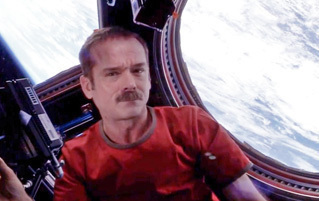
Chris Hadfield, whom you may recognize from all of the videos he uploaded to YouTube about his life aboard the International Space Station, wanted to be an astronaut ever since he watched the moon landing on television at the age of 9. So, he became one. It wasn't easy -- it took decades of hard work, sacrifice, immeasurable support from his family, and a bit of luck. Chris recently talked to Cracked about a few of the things he learned during two space shuttle missions and five months aboard the International Space Station, and he let us know that ...
It Will Kill You in Surprisingly Mundane Ways
I went blind for half an hour on my first spacewalk, which is every bit as worrisome as it sounds. You see, we have a water supply in our suits, because we'll be outside for eight hours at a time, and space station maintenance is thirsty work. A few drops got loose, picked up the anti-fog chemicals from my visor, and flew into my left eye.
My body did the natural thing, which was to try and flush the intruding droplets out with tears. But tears don't fall in space -- they just build up like a clogged drain. And they kept building up until I was blind in both eyes. It was like my head was stuck in a fishbowl. In space.
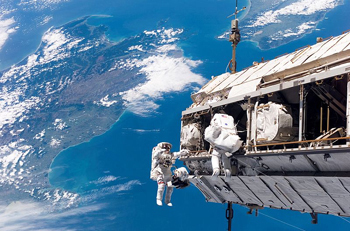
There's a reason aquavision never caught on as a superpower.
It was a weird experience, because pretty much all of my senses were useless to me. All I could do was talk. At first we thought there might be a gas leak in my suit, so I vented it, which is another way of saying that I got to float in space while utterly blind and listening to my oxygen hiss out into the universe. It's not an experience I can recommend, but I stayed calm -- moments like that are exactly why we go through so much training and place so much trust in each other in the first place.
After all, these situations aren't unheard of. Luca Parmitano came close to drowning in space when his water supply leaked into his helmet. The crew of the Russian space station Mir had to put out a fire while dealing with malfunctioning gas masks. And we all know the story of Apollo 13, although the true-life incident involved much less Tom Hanks.
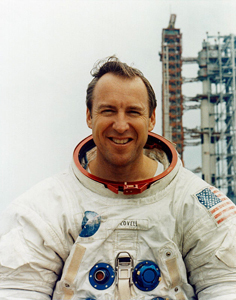
Not that the real Jim Lovell was any less disarmingly likable.
Tragedy, of course, is not unknown to space exploration. Between Challenger, Columbia, Soyuz 1, and Soyuz 11, 18 astronauts have been killed on missions. Eleven more have died during training. Ground workers have also given their lives, including 48 who were killed during a single rocket fueling gone wrong. And then there's the long, harrowing list of close calls where we narrowly avoided disaster.
Now, I don't mention that to scare anyone into thinking that space travel isn't worth the risk, but to explain why we take the risks. When I sat on the launchpad, I knew there was about a 1 in 38 chance that I was about to be killed. Those are decent odds at the casino, but not the greatest when you're strapped to one of the most complicated machines ever built about to rip free from the bonds of Earth. I had no proof that the men and women responsible for my safety didn't rush through the job so they could cut out early for lunch, but because I trusted them, I knew that wasn't the case.
That's why I didn't panic when I went blind. It wasn't just because I have a long history of facing down dangerous situations like a mustachioed John McClane (although I do), but because I knew that no matter what happened, my crew and I would do the best we possibly could to deal with it. You'd be surprised by what sort of risks you're willing to take when you have knowledge, experience, and trust at your back.
Going to the Bathroom in Space Is Awesome
"How do you go to the bathroom in space?" is one of the most common questions I'm asked, because no matter how old you are, pooping in space captures the imagination. It's actually rather simple.
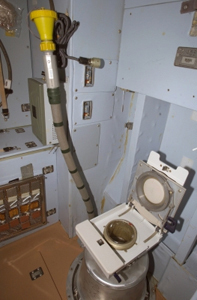
Even if the apparatus is terrifying.
For the solid waste, air sucks it into storage, where it's exposed to the vacuum of space, which kills off any bacteria and neutralizes the smell. We have to brace ourselves in order to keep the digested remnants of our freeze-dried ice cream from floating off into the station, but other than a bit of an upward draft, it's rather comfortable. The waste is packed onto returning supply ships, which burn up when re-entering the Earth's atmosphere (so if you saw a shooting star in early 2013, you might have had me to thank, although I wouldn't recommend wishing upon it).
For urine, men use a funnel and women use a cup. These attach to a tube that sucks the urine into storage, where it's later converted into drinking water. It's expensive and impractical to bring water up to the station, so every drop of refinable liquid counts. And you can pee upside down, which I did, just for fun. Wouldn't you?
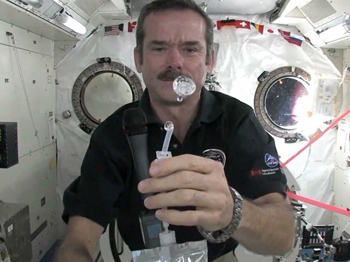
Just try not to overthink the whole process.
The real trick is knowing when you need to go. We all know what that feels like on Earth, but when there's no gravity to push waste downward through your body, it can't give you its regular cues. The first time I went to space, I was working away when I happened to notice that my stomach was swelling up like a balloon. Only then did I realize that it was time to go take care of some business.
But in general, space-bathroom technology has come a long way over the years. As Dan O'Brien once mentioned, some free-floating feces escaped into the cabin during Apollo 10, prompting the three men involved in mankind's most groundbreaking mission to date to point fingers at each other like third grade narcs. That's because Apollo 10 didn't have a toilet -- they went to the bathroom in bags, and when you're in a hurry, going number two in a bag is an imprecise science (as it is in any situation, really).
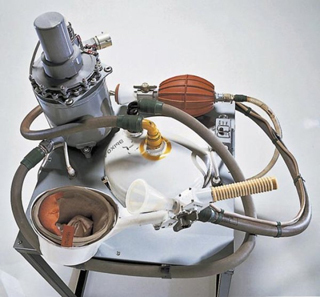
Although it's still preferable to the medieval torture device the Russians were dealing with.
Luckily, I only had a similar experience on the space shuttle once. I was working in the middeck and saw a piece of used toilet paper that had somehow escaped the vacuum of space go floating by. I had to grab a pair of rubber gloves and clean it up, which wasn't fun, but anyone who's raised kids has seen worse. It's all part of the job, and it's a small price to pay to pee upside down in space.
Even Everyday Tasks Require Inventive Solutions in Space
It's not just going to the bathroom that changes in space -- you need to relearn everything you do. Picture the most mundane everyday task that you can think of, and I guarantee that space will require you to adjust your approach. For example, when you cut your nails on Earth, you can let the cut scraps fall to the ground. They'll be vacuumed up in six months, or the dog will eat them, whatever. But when we cut our nails in space, we can't let them float away -- six months' worth of five people's nail clippings could drift together to form a horrific eyeball-shredding clump of nastiness. So what do you do?
It's simple -- you cut them next to an air duct. The nails get sucked against the mesh, and they can be vacuumed up during our next general cleaning. I actually made a video to demonstrate, which I believe gives me the top two most-viewed nail trimming videos in history. Sometimes the proudest moments of your career are the ones you least expect.
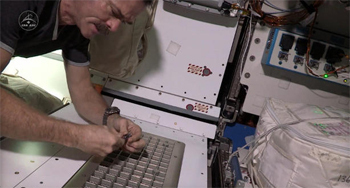
Admittedly, I got fewer views than a video of a farting hippopotamus, but it's still an achievement.
Laundry is even easier -- much like your college dorm years, we don't even bother doing it. A good pair of jeans will last for six months in space, and I wore the same socks and underwear for four days straight (I tried to continue doing this on Earth in the name of science, but my wife objected). That's because our clothes aren't actually touching us -- they're floating away from our bodies, meaning they're not pressed against our skin, soaking up all the funk. That's not something you'd ever think of, but it makes perfect sense as soon as you experience it.
If you need a haircut, just ask a colleague to grab the hair clippers, which are connected to a vacuum tube. As a general rule, most astronauts don't have any salon experience, but we're more about function over fashion. Trimming my mustache was trickier and required the use of an actual vacuum cleaner, but I'm always careful when trimming it anyway, as it is the source of my power.
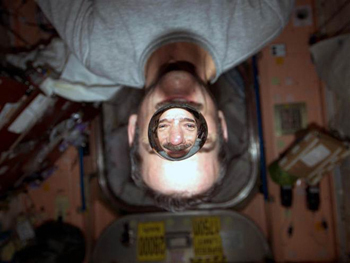
BEHOLD.
The hardest tasks are the ones you wouldn't expect. Putting on our exercise shoes was surprisingly tricky, because with a shoe on one foot and two hands tying the laces, you're left with only one foot to brace yourself and keep the other shoe from floating too far away.
The best everyday activity in space is sleeping. We simply strap ourselves into a vertical sleeping bag and nod off. That may sound uncomfortable, but think about it -- you can relax every muscle. No pillow, no weird bumps in your mattress ... you literally just float there until you go to sleep. I imagine it's what being in the womb must have felt like.
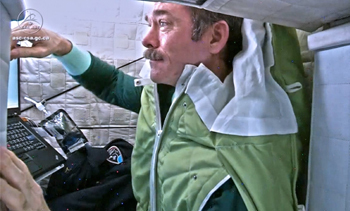
If the womb had email access.
Going Into Space Makes You Puke, Coming Back Makes You Shamble Like a Drunk
There's a reason our training plane is nicknamed the Vomit Comet.
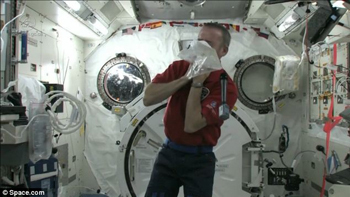
No one who applied for a job at NASA had dreams of designing a barf bag, but they're the most
underappreciated pioneers of space exploration.
It's not fun to throw up in space. Unlike the recycled SkyMall catalogs that airsickness bags are made of, astronaut puke satchels are heavy duty. But you don't need them for long -- on average, it takes about one to three days to adjust to weightlessness. After that initial incident, you rarely feel more than a little queasiness (we have medication to help with the transition). When you think about what your body is adapting to, it's amazing how flexible we are.
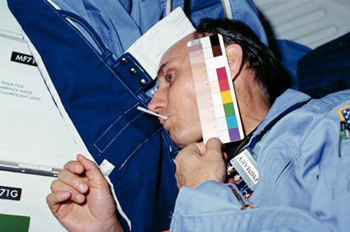
But even at the best of times, it's still a pretty bumpy ride.
Once you're physically comfortable, you're still a long way off from moving around gracefully. When I went to Mir, we had only been in space for a few days, and we came blundering in like clumsy house guests. The three cosmonauts on board had been in space for months, and they were wincing when they watched us, like we were a bunch of drunken bears on ice skates.
As it happens, ice skating is a perfect analogy. When you go skating, you're going to see everything from people tripping over their own feet and crashing face-first into a frozen lake to people gliding along and pulling off triple axels like nimble sorcerers. At first you stumble, but it doesn't take long to pick up the basics. It's the same in space -- after a while you get really elegant, and it becomes tremendous fun.
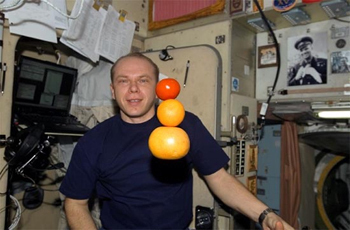
Then the food-juggling lessons start.
Returning to Earth is a bigger adjustment, because your bones and muscles atrophy when they aren't in use. I lost 8 percent of the bone across my hips, and that's after two hours of exercise every single day in space. I wouldn't have been able to pass a sobriety test for a week after I returned, and it was four months before I could run properly. In that first week, you're lumbering around like a guy in a Godzilla costume.
You also have to readjust mentally. You'll try to float a pen or a water bottle over to someone and watch it clunk to the ground, because you've forgotten about gravity. When I woke up in the morning, I didn't just try to float out of bed -- I was convinced that I was floating above the bed like Sigourney Weaver in Ghostbusters. I literally felt weightless. Your body has just as much trouble adapting to gravity after going without it for five months as it does adapting to the lack of it in the first place. But all things considered, it was a pretty smooth transition.
Astronauts Play Adorable Space Games
Before anyone asks, no, sex in space is not part of our downtime. We're a small group of focused professionals working in a zero-gravity enclosed environment without a lot of privacy -- even if we wanted to, it would be challenging, to say the very least. As space travel becomes more common and sophisticated, it will probably happen, but it's not happening at the moment, so please don't write any fan fiction about me.
Otherwise, as commander of the station, I was constantly looking for ways to make things fun, because even though we all love our jobs, the stress of being in a hostile environment for so long away from our families still gets to us. Hide and seek is a good game, and I invented a space-friendly variant of darts.
We also organized races to the other end of the station, and set rules and recorded times. If all of this sounds like something a little kid would dream of doing in space, well, that's because it is (remember, I've wanted to be an astronaut since I was 9). After four and a half years of exhaustive training for a single mission, the little kid inside of you can get pretty loud.
We also love playing music. That's another skill you have to relearn, whether it's the flute, the keyboard, or in my case, the guitar. It's easy to overshoot the frets, because you're used to having the weight of your arm guide you. On the plus side, you don't need a strap, and you can sing "Rock Lobster" to the entire planet.
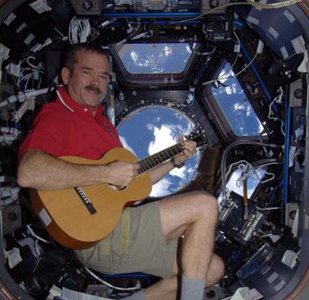
"Watch out for that piranha! Eh rek eh rek ah hoo!"
The "Space Odyssey" video I made was a weekend project with my son, because you still have to make time for your family even if you're orbiting the Earth. Then there are my lesser known covers of classics like "Hello Kitty," "My Love Is Like ... Wo," and "Frantic Disembowelment." I also got to record a song with the Barenaked Ladies, easily Canada's most famous nudity-themed rock band. The point is, music is a great way to unwind in space.
You See a Lifetime Worth of Beauty Every Day
Of course, there's a big reason I was happy to do all of this, including the part about risking my life: Being in space is about the single most jaw-dropping experience a human being can have. When I was on that spacewalk, I wasn't a 9-year-old kid looking up at the stars anymore -- I was among them. I know our spacesuits look bulky, but when you have the majesty of the rotating Earth on one side of you and the staggering, infinite blackness of the universe on the other, that suit feels mighty thin.
The Earth is even more incredible to see when there's a lightning storm on the night side. You can see lightning rippling and zapping through the clouds like a great big neon bulb. It's almost like someone's dragging a giant white highlighter over the world. You get a sense of the storm's sheer size that's impossible to see from Earth. It's the closest thing a person can get to feeling like Thor.
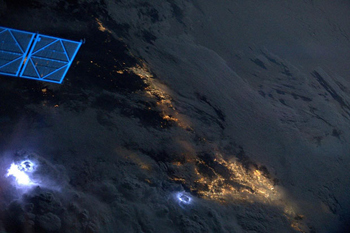
"If I had a hammer ..."
Then there are the auroras, which are gorgeous. Everything in space looks like a special effect -- that's how unreal it is.
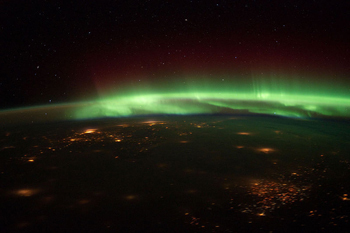
That or nature is hella convincing with After Effects.
It's almost impossible for me to pick the most awe-inspiring moment of my career, but if, hypothetically speaking, an Internet comedy site demanded me to, here's what I'd say: When there were just three of us on the space station, waiting for the next guys to launch, we came over the launch site in Kazakhstan. It was nighttime, and I actually saw the rocket take off. That was amazing, just to be in the position to anticipate it and see it coming. It was like the Earth itself was sending a rocket to us. That's a memory I'm going to have for my entire life, and I've been fortunate enough to be able to say that I have a great deal of those. Nothing about being up there is underwhelming.
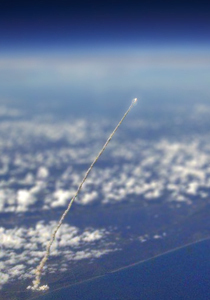
"Oh boy, just another one of the most incredible things I've ever seen!"
Seeing our home spinning silently in the void is humbling, motivating, and staggeringly beautiful. It changes your perspective of the world. Being an astronaut meant I got to experience moments like that every day while fulfilling a childhood dream, knowing that everything we accomplish today pushes the boundary for what we can accomplish tomorrow. I became an astronaut because I saw no reason why I shouldn't. And so I'd be able to tell my grandchildren I peed upside down.
This article was written by Cracked based on an interview with Chris Hadfield, the first Canadian commander of the International Space Station. Visit his website to learn how to buy his book, An Astronaut's Guide to Life on Earth.
Mark Hill hasn't been to space, but he was the first Canadian to have a website in cyberspace. Visit it here.
Related Reading: Cracked spoke with a North Korean defector recently, and we learned some shocking things about life in the hermit kingdom. We talked to a woman who was raised in a Christian Fundamentalist cult, and a woman who was an accidental accomplice to mass murder as a child. Interested in more? Read about life fighting cartels as an undercover operative. Got a story to share with Cracked? We're right here.






